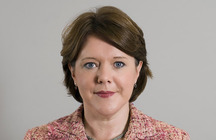Maria Miller – 2013 Speech to the Advertising Association Conference
The below speech was made by the Culture Secretary, Maria Miller, on 31st January 2013 in London.
Thank you Cilla Snowball and to the Advertising Association for putting on this event and asking me to speak to you today. With my background in the industry, this is a particularly special moment for me, addressing so many influential people from across the advertising world. You’ve heard already today from companies that advertise, agencies that create ads and the media in which the ads appear. Clearly, the Government has a strong interest – and an important role to play – in the success of all those parts of the chain. There can be no doubt as to the value that advertising has, as a driver of investment, tourism and growth. Making this case is something that I am personally committed to. I believe it is vital that we enable the advertising industry to maximise its impact on the UK economy while at the same time, loosing none of its reputation for originality and creativity. I want to talk to you today about what we can do together to make the most of the huge potential for economic growth driven by the advertising sector that Deloitte have identified in their new report for the Advertising Association ‘Advertising Pays: How advertising fuels the UK economy’.
UNIQUELY BRITISH ADVANTAGE
It won’t surprise you to hear me say that the biggest problem facing this country is how we get the economy growing again. I have the great responsibility of running a department which has a key role to play in that. Often you hear people talking about manufacturing or the financial sectors in regards to boosting economic growth. However, I firmly believe that we need to look in another direction, towards creative industries like advertising which have a holistic benefit to the economy and to Britain.
DCMS estimates that advertising directly contributed £6bn to the economy – a very sizable portion of the total £36bn the creative industries contribute to GVA altogether, ahead of TV and film and more than design and architecture combined.
Deloitte’s report looks deeper than this and asks: what’s the wider role that advertising plays in the economy? The answer the report comes up with is impressive – £16bn of annual expenditure on advertising in the UK adds £100bn to UK GDP by raising the level of economic activity and boosting productivity. In other words, according to Deloitte, for every £1 spent on advertising, £6 is generated for the economy.
More of that in a moment, but reading these eye-popping figures, it struck me that a really significant part of what makes our ad industry so successful all over the world is its very Britishness.
Whether its Burberry reaching out to new markets in Russia, Hong Kong and India on youtube or international computer giant Acer choosing the UK agency ‘Mother’ to create an exciting new European campaign harnessing the power of the latest animation technology, the UK is leading the world. We lead because of our history, culture and arts, because of what the world associates with being British. There isn’t any better example of what we did than last summer, when Britain was marketed to the world. Global brands come to Great Britain to get the best market for their products, and Great Britain brands gain a global market through the strength of our advertising talent. This adds up to an export business for advertising services worth at least £2bn. And this doesn’t include the huge value advertising adds to economy in terms of selling Britain – as a GREAT tourist destination and GREAT place to do business.
I hope it’s becoming clear that I am hugely proud of our ad industry, the impact it has on our economy and on our reputation abroad. I am determined to be its champion and cheerleader. And I think one way to do that is to identify what gives us a special British advantage and challenge you to maintain it. I would argue that a key part of the domestic and international success of the British ad industry is that is reflects our unique culture. The industry’s direct connection with the diverse UK population and a culture of openness and tolerance allows us to engage creatively with people all over the world. I expect the strong tradition of robust self-regulation to continue and that you will all play a part in upholding the UK ad industry’s worldwide reputation for decency and honesty – as well as creativity.
ADVERTISING AS A DRIVER OF GROWTH
What’s really eye-catching in Deloitte’s report is their claim that that increasing spending on advertising leads to a beneficial impact on GDP. So advertising could be the oil in the machinery of a recovering market economy. The levers work in a number of ways:
Advertising promotes innovation and differentiation within a market;
It drives price competition;
It encourages overall market growth;
It funds media and the creative industries (I want to come back to that one);
And it supports a wide range of employment.
Deloitte’s estimate puts the number of jobs supported directly and indirectly by the £16bn of advertising spend at 550,000.
It’s clear that advertising has a significant potential part to play in the future growth of the economy. The challenge I want to put to you is, what should we be doing to unlock that potential?
I was pleased to see in IPA’s 2012 census that of the nearly 20,500 people employed in UK ad agencies, 50 percent are female. I was slightly more concerned by the fact that women occupy only about a 5th of senior positions in the industry. This might not be bad compared to many other industries, where women are lucky to find a seat round the Board table at all. But in a world where the majority of advertising is aimed at women, is it sustainable to have most of that created by men? I think there’s work to be done here to ensure we retain that critical British advantage.
I know that some of you feel that there’s potential for the Government to offer more help to small and medium sized businesses. As a government, we are committed to ensuring that SMEs get the best possible chance to do business, but we want to hear from you about what else we can do.
Others may feel what you really need to grow is better access to consumer data. It’s absolutely crucial that we strike the right balance between the protection of consumers and the ability of business to use data to deliver products and services that people want. I know we face challenges with the EU Data protection proposals and I will work hard with our colleagues at the Ministry of Justice to ensure our approach to negotiations reflects your concerns. We must ensure that the impact and the practical effect of the current proposals is clearly understood by our friends in other Member States and indeed by members of the European Parliament. If we can achieve this I am confident that we will have a data protection framework that is both practical for business and delivers real safeguards for consumers.
ADVERTISING IS THE KEY TO UNLOCKING THE DIGITAL AND CREATIVE ECONOMY
One of the things I loved about working in advertising was the feeling that we were both feeding-off and driving creative and technological innovation. In my view, advertising, like many of the other creative industries, is an important landmark in the UK’s cultural and artistic landscape.
The creative talent that makes Britain a breeding ground for great films and TV, amazing special effects and wonderful music is the same creative talent that inspires and makes our advertising. Would Tom Hooper, director of the Les Miserables film, be the toast of Hollywood today without his grounding in making ads? The same could be said of Ridely Scott or Sam Mendes, two great talents to come out of your industry.
What’s more, the benefits flow in both directions. The advertising industry is absolutely critical to funding the creative industries and promoting them to as wide a market as possible. Deloitte show the UK cinema box office could have lost out on £300m in 2010 – 27 percent of total revenues– without advertising getting audiences through the doors. Almost 30 percent of TV revenues come from advertising. As David Abraham showed this morning, broadcasters like Channel 4 still have a symbiotic relationship with advertisers – yes, one that is changing and evolving – but still as critical as ever. 68 percent of newspapers’ revenue comes from advertising and over 500 local and community radio stations around the country are supported by advertising.
The Creative Industries are at the heart of economic growth, they are what makes Britain unique, they inspire investment and tourism and growth. I hope I have outlined the crucial role that advertising has to play in that.
CONCLUSION
In conclusion, let me say again that I personally take very seriously my responsibility to fly the flag for the British advertising industry. The value that I seek to make around the importance of advertising to the economy is not a new case, but it is perhaps a case that hasn’t been made loudly enough before. There is a critical role for you to play in the future growth of the economy. Now, I just ask you to retain that critical British edge by representing our unique, diverse culture; and to keep telling me and government what we need to do to help you prosper.


